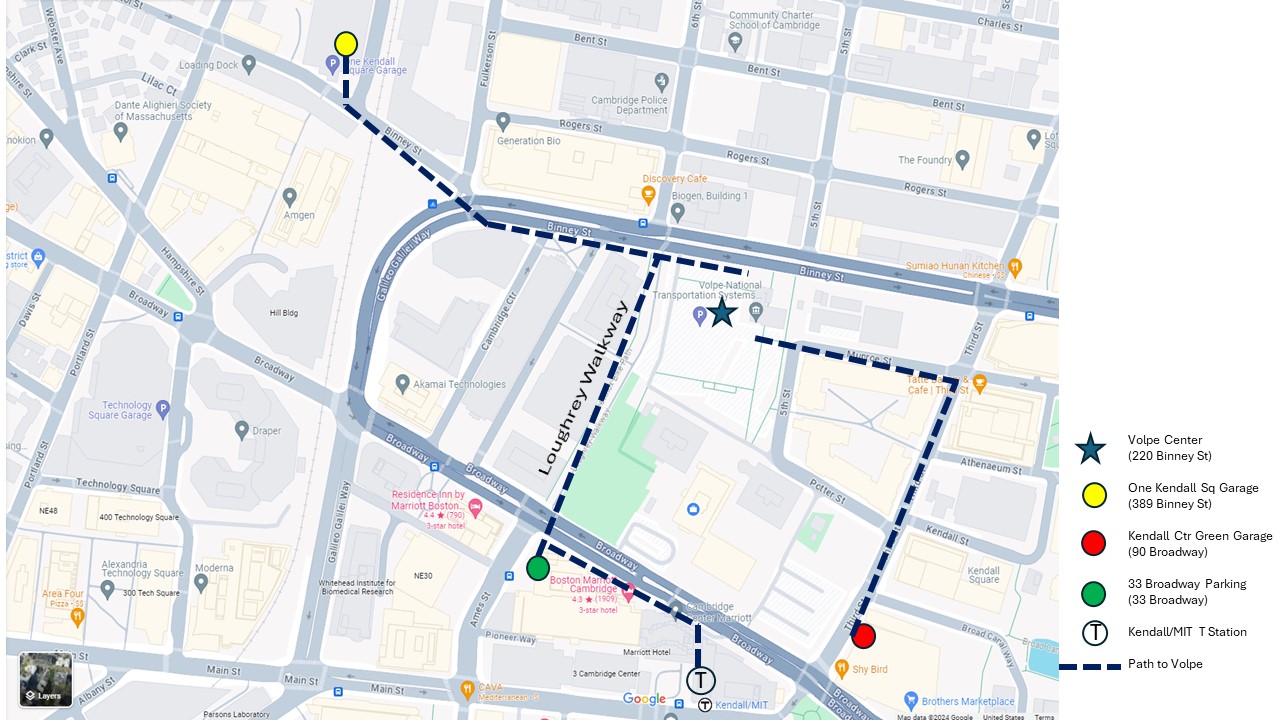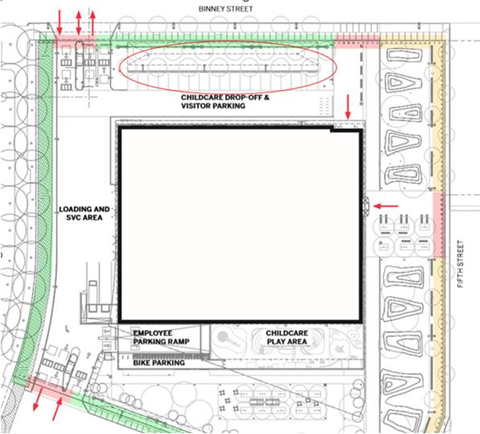Contact Us

Part of the U.S. DOT’s Office of the Assistant Secretary for Research and Technology, the U.S. DOT Volpe Center’s official name is the John A. Volpe National Transportation Systems Center.
Situated in the heart of Kendall Square, the U.S. DOT Volpe Center is located near the MIT/Kendall Stop on the MBTA Red Line.
For Uber/Lyft/Taxi: Use the address 126 Munroe Street, which will take you to our main entrance.
U.S. DOT Volpe Center
220 Binney Street
Cambridge, MA 02142-1093
Call Us
- Ask Volpe Hotline: 617-494-2224 or askvolpe@dot.gov
- Operator: 617-494-2000
Visit the U.S. DOT Volpe Center
The U.S. DOT Volpe Center welcomes more than 2,000 visitors every year from government, industry, and academia.
International visitors include delegations from Africa, Asia, Europe, and the Americas.
Work with your U.S. DOT Volpe Center host to access local hotels at government rates.
Building Amenities
The U.S. DOT Volpe Center building is fully handicapped accessible. Visitors may access the following amenities while being escorted by their host:
- Visitor bicycle and short‐term vehicle parking
- Cafeteria dining room, sitting areas, collaboration areas, and electrical outlets for device charging (third floor)
- Store (operated by the Massachusetts Commission of the Blind) with snacks, beverages, and prepared food (first floor)
- ATM machine at the Transportation Federal Credit Union branch (first floor)
- Emergency Services from the Health Unit with an on‐staff nurse (sixth floor)
- Private lactation room (sixth floor) (reservations required)
- Quiet Room (sixth floor; noise‐free activities)
- Outdoor terraces (third and sixth floors)
Security Procedures
Official visitors are those who have been invited by a U.S. DOT Volpe staff member or on-site contractor, or any federal employee whose PIV is not enrolled for facility access.
Visitors must pass a security screening checkpoint. It is the host's responsibility to meet guests upon arrival, or when contacted by a security guard, and to escort visitors at all times.
Large group visits (20+ visitors) should be coordinated with security in advance.
Visitor notifications should be sent to Eleanor.Pynn@dot.gov and include date of visit, time of visit, # of visitors, visitors names, escort’s name(s), and reason for visit.
Hosts should provide their guest their contact information as the front desk will call your office to notify you upon visitor arrival.
Accepted Forms of Photo ID
Effective May 7, 2025, visitors to federal facilities, including the U.S. DOT Volpe Center, must comply with the REAL ID Act.
Visitors attempting to enter any U.S. DOT facility using a driver’s license that is not REAL ID-compliant will need to present an alternative form of acceptable identification. Please review the list of accepted identification prior to visitor arrival. All identification presented must be valid and unexpired to gain entrance to the U.S. DOT Volpe Center and other federal facilities.
As an alternative to a REAL ID-compliant driver’s license, visitors may use the following forms of identification for building access:
- State-issued Enhanced Driver’s License
- U.S. Passport
- U.S. Passport Card
- HS Trusted Traveler Cards (Global Entry, NEXUS, SENTRI, FAST)
- U.S. Department of Defense ID, including IDs issued to dependents
- Permanent Resident Card
- Border Crossing Card
- An acceptable photo ID issued by a federally recognized Tribal Nation/Indian Tribe
- HSPD-12 PIV card
- Foreign government-issued Passport
- Canadian provincial driver's license or Indian and Northern Affairs Canada card
- Transportation Worker Identification Credential (TWIC)
- U.S. Citizenship and Immigration Services Employment Authorization Card (I-766)
- U.S. Merchant Mariner Credential
- Veteran Health Identification Card (VHIC)
Photo identification must be shown at the security desk. If you have any questions or concerns, contact your host.
Visitor Parking
Very limited parking is available for all visitors. Visitors should be strongly encouraged to use public transportation.
Advance approval is required to use visitor parking spaces. A visitor parking request must be submitted a minimum of two business days in advance and receive approval of the request prior to visitor parking. Overnight parking by visitors is not permitted. Weekend/Non-Workday (i.e., holiday) parking is not permitted by visitors unless approved by security for work-related reasons. Visitor vehicles are subject to screening and inspection by security.
The visitor parking lot is circled at the top of the map below and is accessed from Binney Street via the gates marked with red arrows to the left of the lot.
Visitor Parking Lot Map

Prohibited Items
In compliance with Regulation Title 41 CFR 102-74.440, Subpart C, federal law prohibits the possession of firearms or other dangerous weapons in federal facilities and federal court facilities by all persons not specifically authorized by Title 18, United States Code, Section 930. Violators will be subject to fine and/or imprisonment for periods up to five years.
Prohibited firearms and projectile weapons includes but is not limited to the following list.
- Firearms or similar device that expels a projectile through the action of an explosive (unless meeting the exemptions listed in 18 U.S.C. § 930(d))
- BB or pellet guns
- Compressed air guns
- Antique firearms
- Flare guns
- Realistic replica or toy firearms (unless meeting the exemptions listed in 18 U.S.C. § 930(d))
- Spear guns
- Starter pistols
- Stun guns, cattle prods, dart-firing stun guns, and other electric weapons or controlled device
- Ammunition, shotgun shells or firearm cartridges, black powder, smokeless propellant powder (unless meeting the exemptions listed in 18 U.S.C. § 930(d)
- Slingshots
Prohibited bladed, edged, or sharp weapons includes but is not limited to the following list.
- Saws, including cordless portable power saws
- Scissors, metal with pointed tips
- Screw drivers (except those in eyeglass repair kits)
- Drills, including portable power drills
- Tools including but not limited to wrenches, pliers, and folding, multi-purpose utility tools, etc.
Prohibited club-like items and striking devices includes but is not limited to the following list.
- Billy clubs
- Blackjacks
- Brass knuckles
- Chains more than 12 inches (jewelry exceptions can be made)
- Night sticks (unless meeting the exemptions listed in 18 U.S.C. § 930(d))
- Martial arts weapons, including nun chucks and Ku batons
Prohibited destructive devices, explosives, or any chemical compound or mixture that has a property of yielding readily to combustion or oxidation upon the application of heat, flame, or shock includes but is not limited to the following list.
- Blasting caps or detonators
- Dynamite, nitroglycerin, trinitrotoluene, ammonium nitrate, and others
- Fireworks
- Gunpowder
- Hand grenades, mine, bomb, rocket, missile, pipe bomb, or plastic explosives
- Realistic replicas of explosives or similar devices
- Explosive or expanding gases
- Gas torches
- Flammable liquids (i.e., gasoline, turpentine, and paint thinner) (unless meeting the exemption listed in 18 U.S.C. § 930(d)(3))
The prohibited list of disabling chemicals and other dangerous items includes but is not limited to the following list.
- Mace, pepper spray, tear gas, tear gas gun, or other chemical spray designed for self-defense (unless meeting the exemption listed in 18 U.S.C. § 930(d))
- Spillable batteries, except those in wheelchairs or similar devices used by a mobility impaired individual
- Spray paint (unless meeting the exemption listed in 18 U.S.C. § 930(d)(3))
- Poisonous gases
